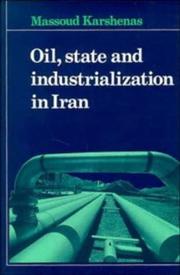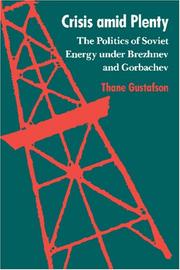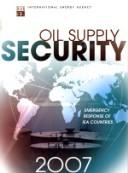| Listing 1 - 10 of 23 | << page >> |
Sort by
|

ISBN: 052138351X 9780521383516 Year: 1990 Publisher: Cambridge New York Sydney Cambridge University Press
Abstract | Keywords | Export | Availability | Bookmark
 Loading...
Loading...Choose an application
- Reference Manager
- EndNote
- RefWorks (Direct export to RefWorks)

ISBN: 0821372661 9786611000998 128100099X 082137267X Year: 2007 Publisher: Washington, D.C. : World Bank,
Abstract | Keywords | Export | Availability | Bookmark
 Loading...
Loading...Choose an application
- Reference Manager
- EndNote
- RefWorks (Direct export to RefWorks)
Although host governments and investors may share one common objective - the desire for projects to generate high levels off revenue - their other goals are not entirely aligned. Host governments aim to maximize rent for their country over time, while achieving other development and socioeconomic objectives. Investors aim to ensure that the return on investment is consistent with the risk associated with the project, and with their corporations' strategic objectives. To reconcile these often conflicting objectives, more and more countries rely on transparent institutional arrangements and flex
Book
ISBN: 2717803858 9782717803853 Year: 1981 Publisher: Paris Economica
Abstract | Keywords | Export | Availability | Bookmark
 Loading...
Loading...Choose an application
- Reference Manager
- EndNote
- RefWorks (Direct export to RefWorks)
Book
ISBN: 9264174575 9264174567 Year: 2012 Publisher: Paris : OECD Publishing,
Abstract | Keywords | Export | Availability | Bookmark
 Loading...
Loading...Choose an application
- Reference Manager
- EndNote
- RefWorks (Direct export to RefWorks)
Technological innovation can lower the cost of achieving environmental objectives, so it is important to understand how environmental policy design and technological innovation are linked. This is particularly true in the area of climate change where the estimated future costs of reducing greenhouse gas emissions are affected greatly by the technological trajectory of the economy. While we suspect that public policy can play an important role in accelerating the development and diffusion of climate change mitigation and adaptation technologies, empirical evidence in this area remains scant. This book presents a series of papers that explore the extent to which technological innovation can lower the cost of achieving climate change mitigation objectives.
Book
ISBN: 1621004155 1621004848 9781621004844 9781621004158 Year: 2012 Publisher: New York
Abstract | Keywords | Export | Availability | Bookmark
 Loading...
Loading...Choose an application
- Reference Manager
- EndNote
- RefWorks (Direct export to RefWorks)
Energy policy -- United States. --- Imports -- United States. --- Petroleum industry and trade -- Government policy -- United States. --- Petroleum industry and trade -- United States. --- Petroleum industry and trade --- Imports --- Energy policy --- Business & Economics --- Industries --- Government policy

ISBN: 0691023409 1400860547 0691608229 0691636699 Year: 1989 Publisher: Princeton, New Jersey : Princeton University Press,
Abstract | Keywords | Export | Availability | Bookmark
 Loading...
Loading...Choose an application
- Reference Manager
- EndNote
- RefWorks (Direct export to RefWorks)
Although the Soviet Union has the most abundant energy reserves of any country, energy policy has been the single most disruptive factor in its industry since the mid-1970s. This major case study treats the paradox of the energy crisis as an essential part of larger economic problems of the Soviet Union and as a key issue in determining the fate of the Gorbachev reforms.Originally published in 1989.The Princeton Legacy Library uses the latest print-on-demand technology to again make available previously out-of-print books from the distinguished backlist of Princeton University Press. These editions preserve the original texts of these important books while presenting them in durable paperback and hardcover editions. The goal of the Princeton Legacy Library is to vastly increase access to the rich scholarly heritage found in the thousands of books published by Princeton University Press since its founding in 1905.
Energy policy --- Soviet Union --- Petroleum industry and trade --- Government policy --- Gas industry --- Energy policy - Soviet Union. --- Petroleum industry and trade - Government policy - Soviet Union. --- Gas industry - Government policy - Soviet Union. --- Natural gas industry --- Energy industries --- Oil industries
Book
ISBN: 9782729840204 2729840206 Year: 2008 Publisher: Paris : Ellipses,
Abstract | Keywords | Export | Availability | Bookmark
 Loading...
Loading...Choose an application
- Reference Manager
- EndNote
- RefWorks (Direct export to RefWorks)
Une guerre pour le pétrole s'est engagée entre les Etats-Unis, la Chine et l'Inde depuis le début du XXIe siècle. Cette rivalité exacerbe les tensions politiques dans de nombreuses régions du globe et provoque une crise alimentaire larvée.
Petroleum industry and trade --- Energy policy --- Pétrole --- Politique énergetique --- Politique énergétique --- Government policy --- Political aspects --- Industrie et commerce --- Politique gouvernementale --- Aspect politique --- Petroleum --- Geopolitics --- S10/0523 --- S10/0700 --- S09/0264 --- China: Economics, industry and commerce--Power supply (electricity, mining, oil) and computing industry --- China: Economics, industry and commerce--International economic relations (incl. development aid and problems, WTO) --- China: Foreign relations and world politics--General works: since 1989 --- Pétrole --- Politique énergetique --- Politique énergétique --- Coal-oil --- Crude oil --- Oil --- Caustobioliths --- Mineral oils --- Energy industries --- Oil industries --- World politics --- Énergie --- Petroleum industry and trade - Government policy - United States --- Petroleum industry and trade - Government policy - China --- Petroleum industry and trade - Government policy - India --- Energy policy - United States --- Energy policy - China --- Energy policy - India --- Petroleum - Political aspects
Book
ISBN: 0815729758 9780815729754 Year: 1988 Publisher: Washington (D.C.): Brookings Institution,
Abstract | Keywords | Export | Availability | Bookmark
 Loading...
Loading...Choose an application
- Reference Manager
- EndNote
- RefWorks (Direct export to RefWorks)
International relations. Foreign policy --- Polemology --- Relation between energy and economics --- Petroleum industry and trade --- Petroleum reserves --- National security --- Government policy --- Congresses --- Petroleum industry and trade - Government policy - United States - Congresses --- Petroleum reserves - Government policy - United States - Congresses --- National security - United States - Congresses

ISBN: 1850436746 9786612527791 600000818X 1282527797 0857710036 1423709446 9781850436744 Year: 2005 Publisher: London Tauris
Abstract | Keywords | Export | Availability | Bookmark
 Loading...
Loading...Choose an application
- Reference Manager
- EndNote
- RefWorks (Direct export to RefWorks)
This book provides an in-depth and historical analysis of the historical and empirical evidence of the perception that the 2003 Iraq war's rationale was fundamentally economic.
Economic structure --- International relations. Foreign policy --- Economic sociology --- United States --- Petroleum reserves --- Petroleum industry and trade --- Government policy --- Oil reserves --- Oil supply --- Petroleum --- Petroleum supply --- Reserves of petroleum --- Reserves --- Petroleum reserves - Iraq --- Petroleum industry and trade - Government policy - United States --- United States of America

ISBN: 9264040048 926404003X Year: 2007 Publisher: Paris : OECD/IEA,
Abstract | Keywords | Export | Availability | Bookmark
 Loading...
Loading...Choose an application
- Reference Manager
- EndNote
- RefWorks (Direct export to RefWorks)
When Hurricane Katrina hit the Gulf of Mexico in 2005, the region’s oil production and refining infrastructure was devastated and world energy markets were disrupted. The International Energy Agency decided in a matter of days to bring 60 million barrels of additional oil to the market. The emergency response system worked – the collective action helped to stabilise global markets. This book describes the oil emergency response systems of IEA countries and assesses how well prepared the IEA is to deal with an oil supply disruption.
National security. --- Petroleum industry and trade -- Government policy. --- Petroleum reserves -- Government policy. --- Petroleum reserves -- International cooperation. --- Petroleum industry and trade --- Petroleum reserves --- Government policy. --- International cooperation. --- National security --- National security policy --- NSP (National security policy) --- Security policy, National --- Oil reserves --- Oil supply --- Petroleum --- Petroleum supply --- Reserves of petroleum --- Government policy --- Reserves --- Economic policy --- International relations --- Military policy --- Oil fields
| Listing 1 - 10 of 23 | << page >> |
Sort by
|

 Search
Search Feedback
Feedback About UniCat
About UniCat  Help
Help News
News